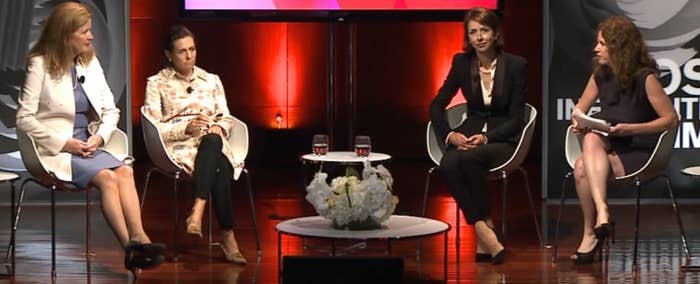
The answer to the question of why funds invest in women leaders, apparently, is they don't.
"Female fund mangers do have better performance," said Alexandra Lebenthal, the head of Lebenthal Holdings, during a panel discussion at the Bloomberg Markets Most Influential Summit in New York today, a conference tied to Bloomberg Markets magazine's list of the 50 most important people in global finance.
But in terms of investing in female leaders, which was the question the panel sought to answer, Lebenthal was quick to add that "women don't get funding."
While investment banks and asset managers have more women in senior roles — the chief financial officers at Morgan Stanley and JPMorgan Chase are women, as is JPMorgan's head of asset management — the hedge fund and private equity worlds are even more male-dominated. Hedge fund manager Paul Tudor Jones, for instance, was widely criticized last year for saying at a forum at the University of Virginia that women, once they become mothers, lose the focus necessary to be good traders.
Addressing that remark on today's panel, Lebenthal cited studies showing that women have higher investment returns than men and said, "It was nice that the facts disagree with that."
Helena Morrissey, the head of the British firm Newton Asset Management, said that hedge funds and private equity firms are "behind traditional asset management in terms of women involved."
A breakdown of the panelists at the conference appeared to support that claim: Of the 19 investment bankers, asset management executives, hedge fund managers, and private equity executives scheduled to speak, only four were women. Indeed, a Bloomberg employee even came on stage before the afternoon panels to discuss an initiative to get more women as panelists at its conferences and asked attendees to nominate women who could be speakers in the future.
Even Ray Dalio, the founder of Bridgewater Associates, the largest hedge fund in the industry, said earlier Monday that he was mostly mystified about why there were so few women in the profession.
"To try to attract women in a really difficult thing ... Is there a perception that this a more jocklike culture? Is there too many men in it and they feel excluded?" Dalio said on a panel he shared with Michael Bloomberg, who recently returned to the company he founded, on leadership to kick off the conference.
Barbara Byrne, a vice chairman at Barclays Capital who spoke on the "Why Funds Invest In Women Leaders" panel, said that if more women were given the opportunity to perform, they could attract investment dollars.
"If you're the person who's generating alpha [better than the market] returns in this market, there will be a path to your doorway," Byrne said, adding that in investment banking and alternative investing (hedge funds and private equity), women "go off into staff positions in their thirties" and abandon the core, profit-generating divisions of their firms.
One problem, Lebenthal said, was that women tend to doubt their own qualifications for more senior roles. "Women are completely qualified for a job and oftentimes they're offered that job and they spend hours thinking they're not qualified and they can't possibly do it, while a man who may not be qualified is the first to raise his hand," Lebenthal said.
To which Byrne replied, "I admire that. That's the real leaning in."
